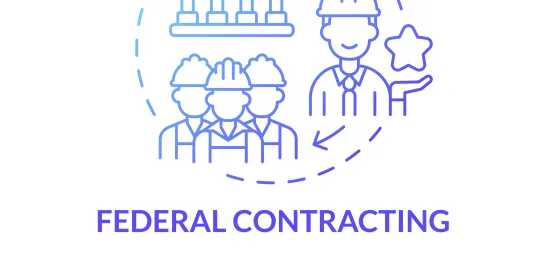In line with the mandates of President Biden’s Executive Order 14110, entitled “The Safe, Secure, and Trustworthy Development and Use of Artificial Intelligence,” and its call for a coordinated U.S. government approach to ensure responsible and safe development and use of artificial intelligence (AI) systems, the Office of Federal Contract Compliance Programs (OFCCP) has published a Guide addressing federal contractors’ use of AI in the context of Equal Employment Opportunity (EEO).
As discussed below, the Guide comprises a set of common questions and answers about the intersection of AI and EEO, as well as so-called “promising practices” federal contractors should consider implementing in the development and deployment of AI in the EEO context. In addition, the new OFCCP “landing page” in which the new Guide appears includes a Joint Statement signed by nine other federal agencies and the OFCCP articulating their joint commitment to protect the public from unlawful bias in the use of AI and automated systems.
Key Points from the OFCCP Guidance
The OFCCP guidance addresses specific, but common questions about the use of AI in the EEO context. Key issues addressed include:
Defining Artificial Intelligence, Algorithms, and Automated Systems and their Use in Employment:
- Citing 15 U.S.C. § 9401(3), the OFCCP defines AI as a machine-based system that can make predictions, recommendations, or decisions based on human-defined objectives. AI may use both machine- and human-based inputs to analyze real or virtual environments and formulate options for information or action.
- OFCCP defines algorithms as sets of instructions followed by computers to accomplish specific tasks. In HR software and employment lifecycle applications, algorithms typically evaluate, rate, and make decisions about job applicants and/or employees with respect to hiring, promotion, compensation and/or terminations.
- The term “automated systems” broadly refers to software and algorithmic processes, including AI, used to automate workflows and assist in decision-making. Federal contractors may use AI systems to enhance productivity and efficiency in employment decision-making, but without human oversight and monitoring, these systems can also perpetuate unlawful discrimination.
Identifying Federal Contractors’ Compliance Obligations:
- OFCCP’s enforcement authority extends to federal contractors’ use of AI and automated systems to comply with their non-discrimination and affirmative action obligations.
- When using AI and automated systems, federal contractors must comply with regulatory record-keeping obligations that will perforce include the use of AI and automated systems in employment decision making; cooperate with OFCCP by providing necessary, requested information on their AI systems; and provide reasonable accommodation(s) to individuals with disabilities regarding the use of or evaluation by AI or automated systems.
- As the OFCCP has previously reported through FAQs on its website, in the event a selection procedure that uses or relies on AI results in an adverse impact on a protected group (generally evidenced when the selection rate for any sex or race/ethnic group is less than four-fifths, or 80 percent, of the rate for the highest selected group – i.e., the “four-fifths rule of thumb”), the federal contractor must validate the system using a strategy that meets applicable OFCCP-enforced non-discrimination laws and the Uniform Guidelines on Employee Selection Procedures (UGESP).
Applying Enforcement Obligations to Vendors:
- OFCCP confirmed that it neither endorses products nor issues compliance certificates to vendors or federal contractors that create or develop AI systems.
- Further, federal contractors remain ultimately responsible for the use of AI systems, even those provided by a third party, and cannot contract away their non-discrimination or affirmative action obligations under the laws enforced by OFCCP.
- Vendors, however, should be aware that the EEOC recently has taken the position that, in certain situations, a vendor selling hiring tools may be subject to Title VII, the Americans with Disabilities Act, and the Age Discrimination in Employment Act as an “employment agency” to the extent it engages, to a significant degree, in screening and referral activities, as an indirect employer by exercising significant control over applicants’ access to employment opportunities with its employer-clients, and/or as an agent of its employer-clients that delegate authority to the vendor to make hiring decisions.
OFCCP’s Promising Practices
In addition to attempting to clarify federal contractors’ legal obligations, to promote EEO, and to mitigate potential harmful impacts of AI in employment decisions, the OFCCP guidance also identifies various “Promising Practices” for the development and use of workplace AI. These “Promising Practices” are consistent with those previously advocated through the White House Blueprint for an AI Bill of Rights, prior EEOC guidance, and similar federal government announcements, including:
Transparency and Accountability:
- Be transparent about their use of AI systems and ensure accountability for their outcomes.
- Regularly assess AI systems for fairness, bias, and adverse impact on protected groups.
- Where a third party or vendor-created AI systems are used, the federal contractor should be able to verify the vendor’s privacy policy and protections of the data provided by the contractor, as well as information on the underlying data captured with respect to the algorithmic formula used for employment decision making.
Data Quality and Training:
- Ensure that training data used for AI models is representative and free from discriminatory biases.
- Continuously monitor and update AI models to improve accuracy and fairness.
Human Oversight:
- Maintain human oversight in AI-driven decisions to prevent undue reliance on automated systems.
- Implement mechanisms for employees and applicants to challenge AI-based decisions.
Conclusion
As federal contractors and subcontractors increasingly adopt AI systems, it is crucial to strike a balance between efficiency gains and EEO compliance. By following the OFCCP’s guidance, federal contractors can harness the benefits of AI, while safeguarding against discrimination and bias in employment practices. Federal contractors also should be aware of the DOL Wage and Hour Division’s guidance with respect to the implementation of workplace AI, a summary of which can be found here.






 />i
/>i

